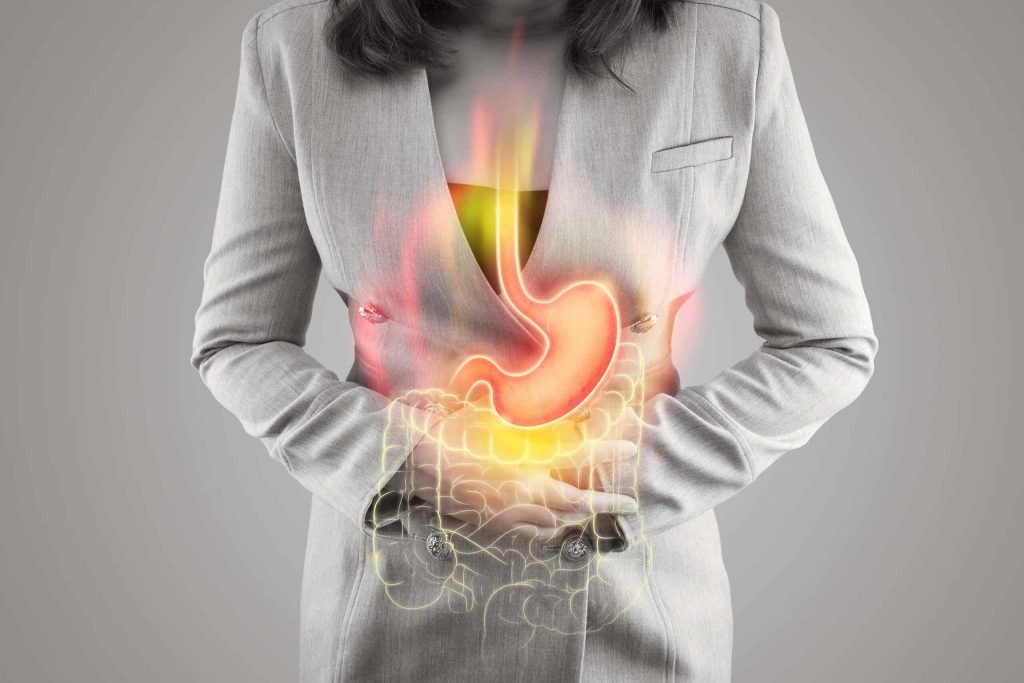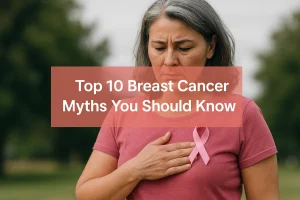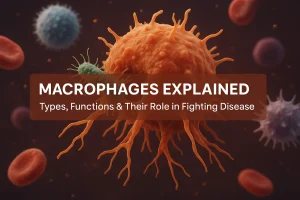
Can Stomach Ulcers Cause Cancer?
Stomach ulcers, also known as gastric ulcers or peptic ulcers, are painful sores in the stomach lining that may eventually turn into stomach cancer if left untreated. Although not all ulcers are harmful, severe or persistent ones can raise your risk of developing cancer and cause long-term harm. Let’s look into the common causes, symptoms, available treatments, and preventive measures of stomach ulcers and cancer.
What Is a Stomach Ulcer?
A stomach ulcer is an open sore that develops on the inner lining of the stomach. These ulcers occur when the stomach’s protective mucus layer is damaged, allowing digestive acids to erode the tissue underneath. The result? Pain, burning, and, in some cases, silent damage with no obvious symptoms.
Types of stomach ulcers?
Depending upon the location and cause, there are mainly 6 types of stomach ulcers:
| Type of Ulcer | Location | Main Causes | Common Symptoms | Cancer Risk |
| Gastric Ulcer | Stomach lining | H. pylori infection, NSAIDs | Burning pain after meals, nausea, bloating | Moderate to High |
| Duodenal Ulcer | The first part of the small intestine | H. pylori, excess stomach acid | Pain improves after eating but returns in a few hours | Low to Moderate |
| Esophageal Ulcer | Lower part of the esophagus | Acid reflux, GERD, medications, and infections | Chest pain, trouble swallowing, sour taste | Low but chronic irritation is risky |
| Stress Ulcer | Stomach or duodenum | Severe stress from illness, injury, or surgery | Often silent; may cause bleeding or pain | Low unless untreated |
| Refractory Ulcer | Stomach or duodenum | Resistant H. pylori, ongoing NSAID use, smoking | Doesn’t heal after 8–12 weeks, with persistent symptoms | High if chronic and ignored |
| Medication-Induced Ulcer | Stomach or duodenum | Frequent NSAIDs, steroids | Stomach pain, acid reflux, nausea | Moderate, especially with continued NSAID use |
Note: Research indicates that untreated ulcers and chronic H. pylori infections are two of the main causes of stomach cancer, especially in high-infection areas like Vietnam, where ~ 20-25% of stomach disorders are caused by peptic ulcer disease.
Can Stomach Ulcers Turn Into Cancer?
Yes, in certain situations. Chronic gastritis ulcers, particularly those brought on by Helicobacter pylori (H. pylori) infection, can result in chronic inflammation, cell damage, and an increased risk of gastric cancer.
What are the common causes of stomach ulcers?
- H. pylori Infection: It damages the stomach lining and increases acid sensitivity.
- Overuse of NSAIDs: Painkillers such as ibuprofen or aspirin weaken stomach protection by reducing mucus production.
- Poor Diet & Eating Habits: Skipping meals, fast food, and spicy or oily food contribute to an acid imbalance.
- Excessive Alcohol Consumption: Damages the stomach lining and slows healing.
- Smoking and tobacco: Delays healing and increases the production of acid.
- Stress: Weakens the immune system and digestion, making the stomach more susceptible.
- Genetic Factors: A Family history of ulcers or stomach cancer increases personal risk.
What are the symptoms of Stomach or Peptic Ulcers
- Severe upper abdominal pain
- Indigestion, burping, or bloating
- Vomiting and nausea (occasionally with blood)
- Loss of appetite or feeling full quickly
- Tarry or black stool (a sign of bleeding)
- Unexpected weight loss
- Pain-related sleeplessness
Note: Keep in mind that not all ulcers produce symptoms. If ignored, silent ulcers can still result in serious complications.
Diagnosis: How Are Stomach Ulcers Diagnosed?
Clinical assessment and certain tests are used in the diagnosis of stomach ulcers in order to determine their cause and severity.
- Gastroscopy (Endoscopy): A camera is inserted to view the stomach lining and detect ulcers or lesions.
- Biopsy: In suspected cases, tissue is collected to rule out cancer.
- Blood and stool tests: Look for H. pylori, hepatic anemia, or internal bleeding.
- Urea Breath Test: Detects H. pylori infection via breath analysis.
What are stomach ulcer treatment options?
Stomach ulcers can be controlled through proper lifestyle management and treatment with medications. These are
Medical Treatment
- Antibiotics (to eliminate H. pylori)
- Proton Pump Inhibitors (PPIs)—Reduce stomach acid
- H2 Receptor Blockers – Decrease acid production
- Antacids and mucosal protectants – Coat and protect the stomach lining
Lifestyle changes
- Eat small, frequent meals
- Avoid NSAIDs, smoking, and alcohol
- Manage stress through yoga, meditation, or therapy
- Stay hydrated and consume a fiber-rich, balanced diet
Surgical Intervention: If ulcers don’t heal with medication or cause serious complications (like perforation or severe bleeding), surgery may be required.
What are the complications related to untreated ulcers?
- Gastrointestinal bleeding: Blood or passing black stools
- Perforation: Ulcer forms a hole in the stomach wall
- Pyloric stenosis: Narrowing of the stomach outlet, causing vomiting
- Stomach cancer: Particularly in persistent ulcers linked to H. pylori
Ulcer to Cancer: When to Worry
Ulcers don’t always cause cancer, but long-standing, untreated ulcers—especially with H. pylori infection—do carry an increased risk. Additional risk factors include:
- Smoking
- Alcohol or tobacco use
- Long-term NSAID use
- Family history of gastric cancer
- Poor dietary habits
Immunotherapy for Stomach Ulcers and Cancer: A New Hope
If you are concerned about the progression of ulcers or the early signs of stomach cancer, immunotherapy is a new type of treatment that strengthens your immune system and helps prevent recurrences.
- Non-invasive, innovative treatment approach
- Personalized treatment plans suited to the patient’s needs
- Comes with minimal side effects
- Early-stage stomach cancer is often curable
Takeaway
Stomach ulcers can be successfully treated with early detection and appropriate care. They could, however, result in major health problems, such as cancer, if untreated. Never disregard symptoms like nausea, vomiting, or unexplained weight loss. Don’t wait; listen to your body and get help as soon as symptoms appear.
People may ask
Can stomach ulcers turn into cancer?
Yes, if left untreated, especially those caused by H. pylori infection, they can increase the risk of developing stomach (gastric) cancer over time.
What are the early warning signs of a stomach ulcer?
Common early symptoms include burning stomach pain, nausea, bloating, loss of appetite, and indigestion. In serious cases, vomiting blood or black stools may occur.
Are stomach ulcers completely curable?
Yes, the majority of stomach ulcers can be completely cured with the right medication (antibiotics, PPIs) and lifestyle modifications. The key is early diagnosis.
Can immunotherapy help in ulcer-related stomach cancer?
Indeed, immunotherapy is becoming an effective treatment for some forms of stomach cancer and may promote healing and reduce inflammation.
What foods should be avoided with a stomach ulcer?
Spicy foods, fried items, alcohol, caffeine, and carbonated drinks should be limited to avoid aggravating ulcer symptoms.
How long does it take for a stomach ulcer to heal?
With proper treatment, most ulcers heal within 4–8 weeks, though chronic or complicated ulcers may take longer.
Is gastroscopy painful?
Gastroscopy is a safe and minimally uncomfortable procedure, usually performed under local anesthesia or mild sedation.
- Breast Cancer Guide: Early Symptoms, Causes, Diagnosis & Treatment
- Can Hair Transplant Cause Cancer?







